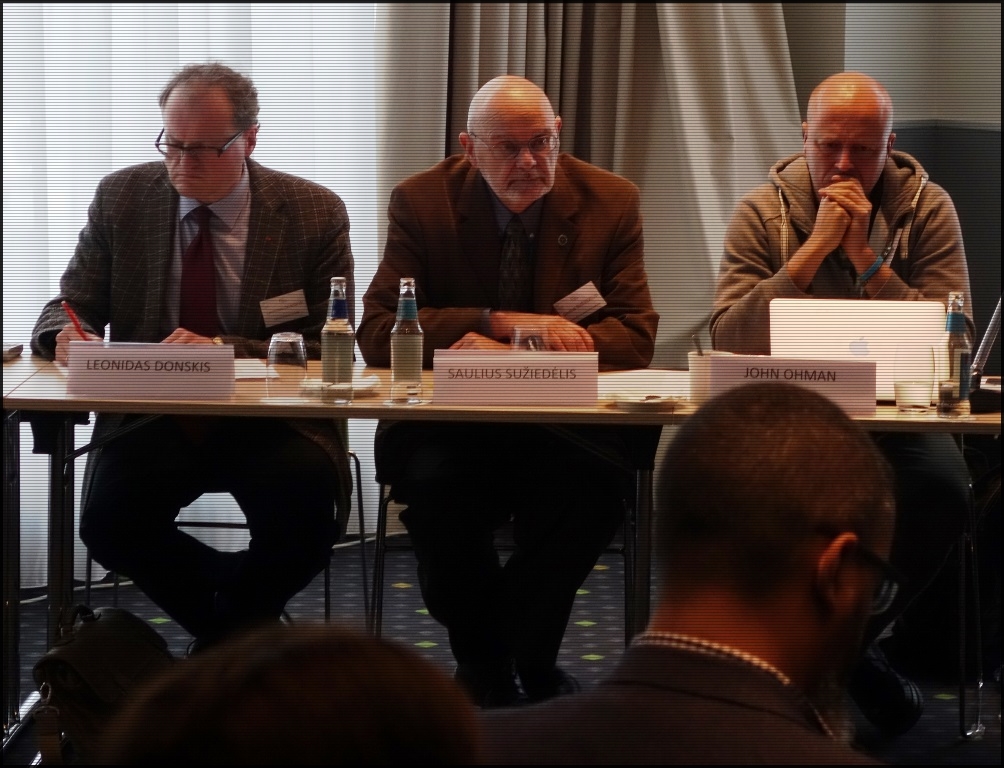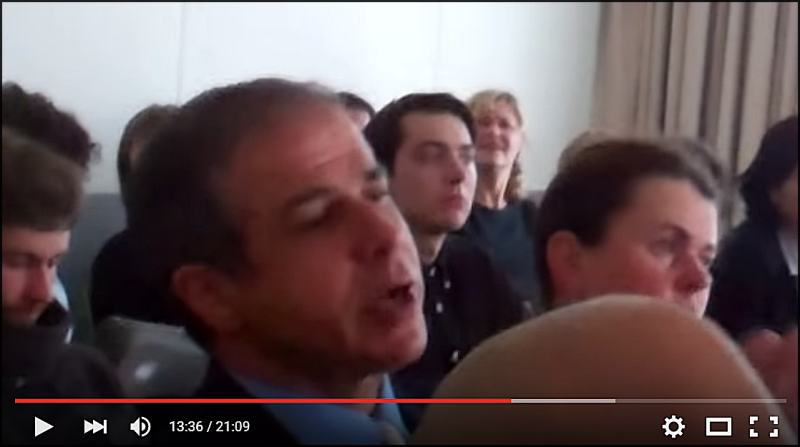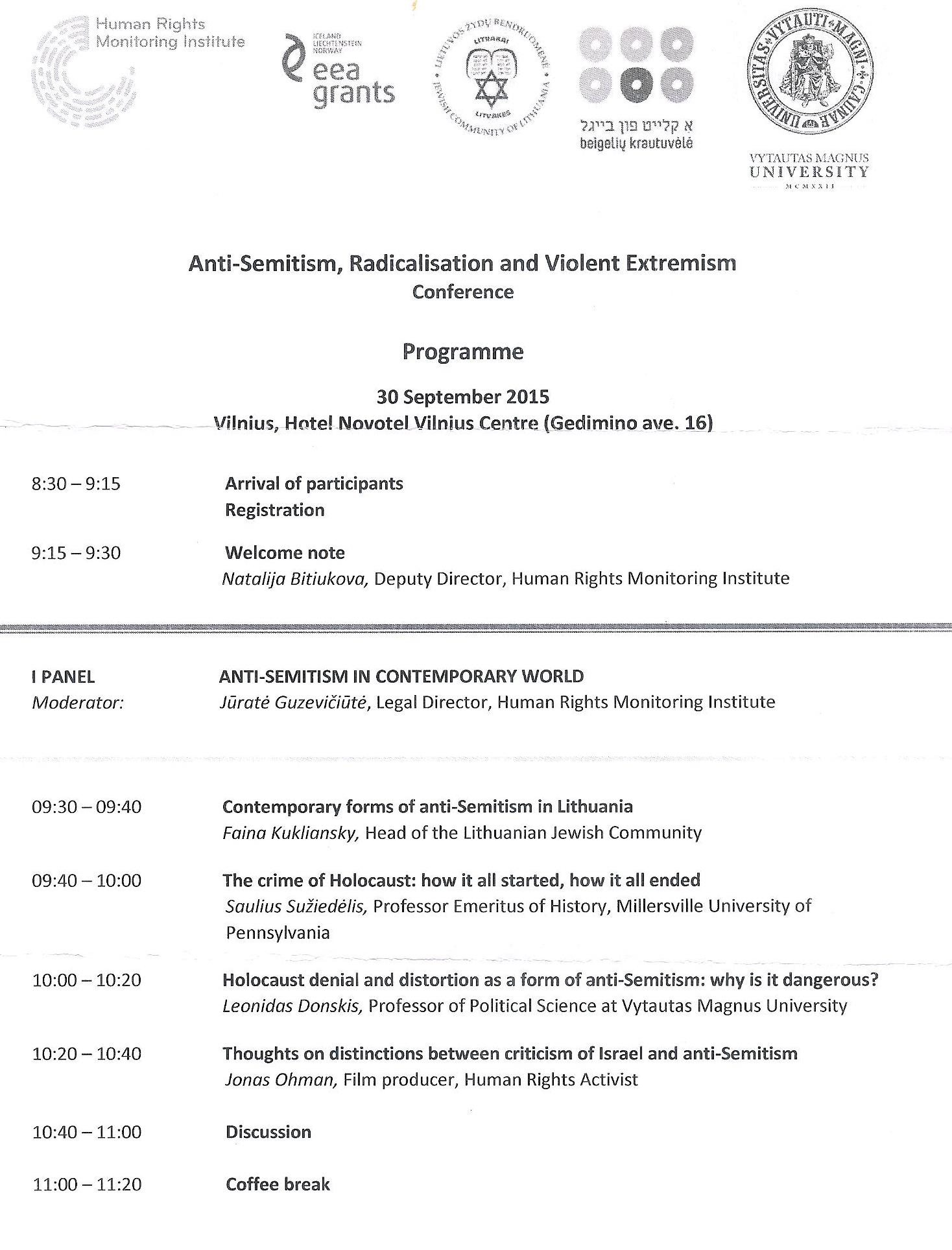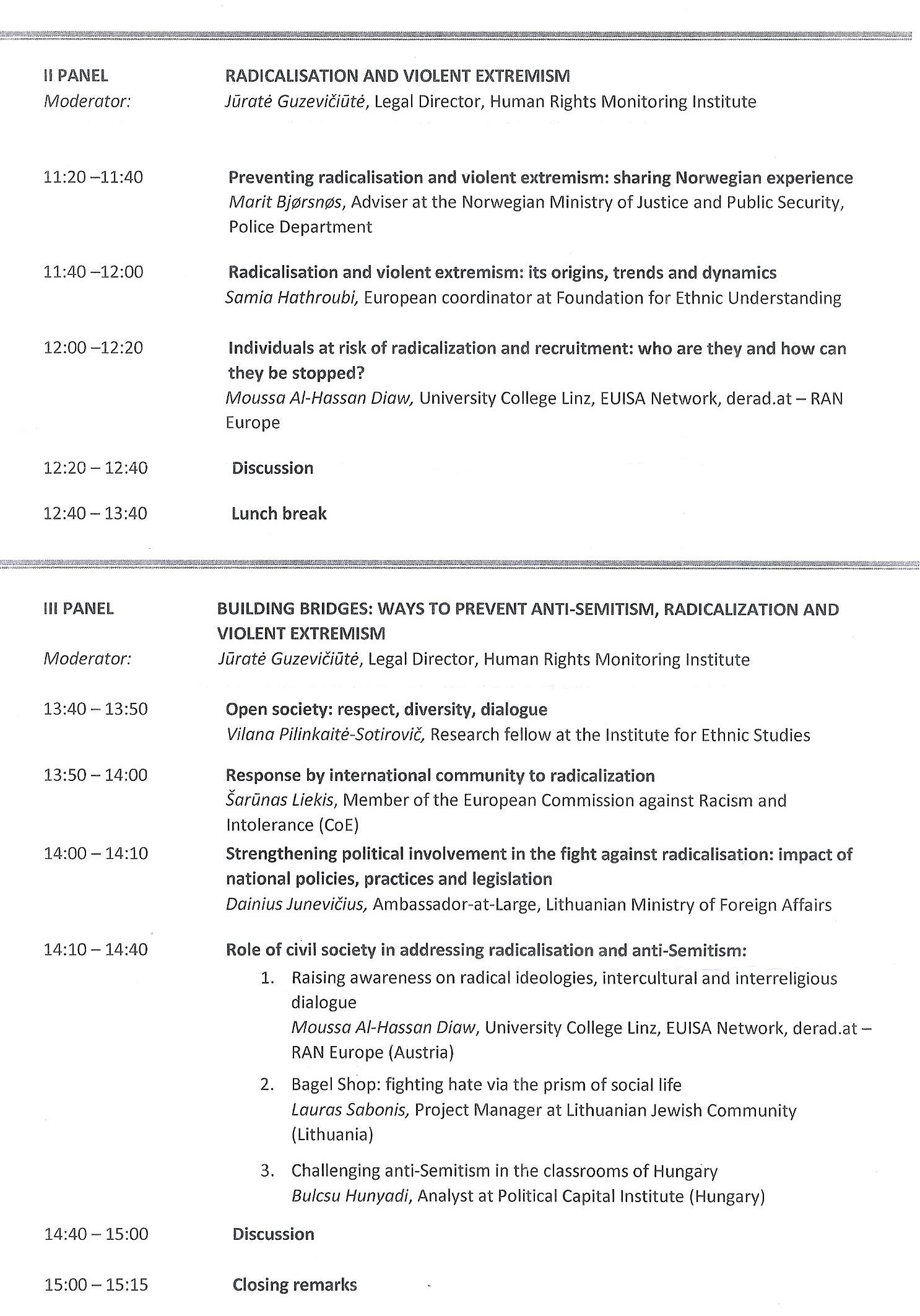Human Rights / Antisemitism / Opinion
by Defending History Staff
◊
The well-organized conference “Antisemitism, Radicalization and Violent Extremism” was held on 30 September 2015 at Vilnius’s Novotel Hotel by the Human Rights Monitoring Institute (HMRI) with partners (see program). It will go down in history as one of the most remarkable capers yet in the fraught local “Dead Jew Business,” as it is increasingly becoming known. The biggest shock of the day was that one of the three keynote morning session speakers was Swedish-born Lithuania-resident filmmaker Jonas Ohman, known in town for his (far right style) glorification of postwar resistance fighters — one of the most painful issues of Baltic antisemitism in the twenty-first century — without the slightest mention of the alleged Holocaust perpetrator background of the precise figures glorified.
But the film maker chosen for the morning session manages at the same time to also be a (far left style) Israel baiter, whose current “humanitarian project” is a petition asking the mayor of Vilnius to sack a Jewish (Israeli-Lithuanian) advisor on the basis of social media “silly photos” that become bacteriologically antisemitic when recycled in his own petition, and beyond, in its recontextualized, politically charged incarnation. Far from doing the same to counter officials and advisors with neo-Nazi links, he boasted in his talk (amateur video) of his links to Right Sector and other Ukrainian groups that adulate wartime Holocaust perpetrators. When he was trashing Israel, the Israeli ambassador to Lithuania, Amir Maimon, sitting in the hall, boldly called out a question: “Are you rewriting the history?” (at time code 13:31).
A conference on antisemitism held in Vilnius, Lithuania, organized by the Human Rights Monitoring Institute, put film maker Jonas Ohman (right) on the same prestigious morning panel with two major professors, Leonidas Donskis (left) and Saulius Sužiedėlis. Ohman’s films about postwar anti-Soviet combatants fail to discuss their alleged Holocaust histories and of late he has become Vilnius’s major Israel-basher too. There were no Lithuanian-born Jews in attendance and there were no talks on current issues of antisemitism in the country. Conference sponsors included Vytautas Magnus University in Kaunas, which continues to feature a bas-relief and lecture hall that glorify the Nazi puppet prime minister who signed papers confirming the transfer of some Jewish citizens of Kaunas to a murder camp and orders for the rest to be incarcerated in a ghetto within a month. Photo: DefendingHistory.com.
Israel’s ambassador to Lithuania, Amir Maimon, asks the speaker if he is rewriting history in his attacks on the Jewish state. Still from amateur video: DefendingHistory.com.
◊
One veteran conference-goer remarked later that hopefully one day soon, the local Jewish community too will again have spokespeople willing to take a polite stand on things. For Jonas Ohman to be legitimized by sitting with two major professors on the prestigious morning panel, at a conference to combat (!) antisemitism, sponsored by a “human rights” organization along with a major university, the official Jewish community (!), a famous university and a major European funding organization was an unmitigated setback for the cause of human rights in the entire region. Let us turn first to the European funding organization.
Not for the first time, the EEA Grants program (via the generosity of non-EU member states Iceland, Liechtenstein and Norway) has been persuaded to sink “good money after bad” into projects on “antisemitism in Lithuania” that avoid just about all the current local and national issues of antisemitism, while excluding from the project each and every one of the veteran Jewish observers of antisemitism (as well as the valiant non-Jewish critics of antisemitism), leading to a furtherance of the Lithuanian nationalist project to “take over” the country’s grand Jewish heritage, from Yiddishless “Yiddish projects,” to “Holocaust education” that promotes double genocide, to conferences on antisemitism in Lithuania that feature excellent presentations on an array of important related subjects but zilcho on the topic itself and close to nothing from Jews themselves.
Try pulling off something like that for Gay, Black, or Roma rights issues, and see how it goes over. But in the case of Jews in some East European countries, the small-numbered and struggling communities can be bait for the “Dead Jew business” which has both its utilitarian motives (interesting projects, funding, careers, profit) and its nationalist agenda of “incorporating Litvak heritage” into “Lithuanian culture” while rewriting Holocaust history to suit the nationalist base. At the conference, the titular head of the Jewish community, the country’s top citizenship and restitution lawyer, Faina Kukliansky, listed on the program to deliver greetings, did not make it, sending as “representative of the Jewish community” Lauras Sabonis, who later spoke again about the “Bagel Shop” project which most Jews consider a vast waste of EEA Grants money during a wave of “Lithuanianization” at their beloved community. An articulate and impressive young man, whose recent ancestors helped save Jews in Kaunas, he alluded himself to the (demographic) crisis in the Jewish community in Lithuania that some think “necessitates” the “Bagel Folks” rushing in with EEA money to “teach the Jews how to fight for themselves.” As actual Bagel jobs have all gone strictly to non-Jews, seemingly as a matter of principle. Vilna Yiddish humor, far from moribund, quickly came up with the now popular phrase in Yiddish speaking circles here: Di góyishke beygl. At the September 30th conference on antisemitism, in Vilnius, Lithuania, there was not a single (!) Lithuanian-born Jew among the crowd of about seventy.
On the slight matter of actually fighting antisemitism, various parties including Defending History asked the Bagels to join the handful of Holocaust survivors and other who peacefully protested the neo-Nazi marches in Kaunas last February and Vilnius last March. The reply was that they would “see if it fits into the project” and needless to say, not one word was uttered when it came to speaking out on actual antisemitism (a devastating contrast with the bold non-Jewish Lithuanians who have so courageously stood up on this and other issues). Among the members of the Jewish community who spoke out about the Bagel’s failure to stand up against real antisemitism was engineer and language teacher Jacob Piliansky, who himself several years earlier boldly spoke out, in Richard Bloom’s documentary film Defending Holocaust History (time code 50:03) about the neo-Nazi marches from the viewpoint of a local Jewish resident born and bred here. The Bagel Shop’s awards for tolerance went to very good people but only those very good people in favor with government circles that “run Jewish affairs.” Defending History responded at the time, not with a critique of that, but with the addition of seven additional symbolic awards for people in Lithuania who fight for human rights, which ipso facto entails doing so even when it is not in the fighter’s career interests and not just a part of his or her day job to do so.
Over the course of around half a year, the emerging and disturbing pattern in the official Jewish community has included effective dismissal of the popular long-time executive director Simonas Gurevičius (who continues to give frequent excellent talks on current antisemitism and would have been a natural for this conference); his successor Alanas Levinas; and most sensationally, the chief rabbi of eleven years, Rabbi Chaim Burshtein, humiliatingly fired after he publicly protested the project to erect a $25,000,000 convention center in the heart of the old Jewish cemetery, itself today a burning issue of antisemitism and discrimination. It would not be contemplated for a Christian Lithuanian cemetery where many of a nation’s greatest scholars came to their final resting place over centuries in a case where the international opposition to the project mounts by the day. That opposition to desecration of the old cemetery includes members of Lithuania’s Jewish community who have dared to speak out, ranging from a Vilna-born Holocaust survivor to a kashruth supervisor to a former deputy head of the Jewish community.
These “internal community woes” need not concern a human rights organization interested in speakers who would address the actual topics to which it is dedicated and look for the actual people in the field to which the conference and its funding are dedicated, whether they are currently in or out of favor with the tiny clique aiming to “run Jewish affairs” in the country. But when the purpose is to avoid those human rights topics — and those dedicated, specialized people — a set of alternative goals and mechanisms inevitably comes into play.
None of the stalwarts who have been tracking and speaking out on antisemitism in recent years (without EEA grants, mind you), such as Evaldas Balčiūnas, Chaim Bargman, Milan Chersonski, Prof. Pinchos Fridberg, Simonas Gurevičius, Rachel Kostanian, Prof. Joseph Parasonis, or Rūta Vanagaitė were invited. Chersonski, in particular, as editor of the Jewish community’s quadrilingual newspaper for a dozen years (1999-2011) could have given the conference a report on his years of tracking and battling the real-live antisemitism here. One irony that emerged is that while Chersonski was excluded, one of the conference’s sponsors was Vytautas Magnus University in Kaunas, whose top historian lashed out in the daily press (not in some academic journal) about fear “of getting hit over the head with a club by the Jews” during the May 2012 festivities honoring the reburial of the 1941 Nazi puppet prime minister. It was Milan Chersonski who courageously took up the challenge to respond. But at this conference, it was one of the “problems” who was invited as co-organizer and one of the “solutions” that was excluded as a speaker. The lingering problem at Kaunas’s Vytauas Magnus University, the merits mention at any conference on antisemitism in the region, is one we shall return to at the end of this report.
Equally, Simonas Gurevičius (Shimen Gurevich), Jewish community executive director for around a decade and a half, despite falling victim to the recent “purge,” continues to be a national voice in the public discourse about antisemitism. Instead, government PR was provided as thick as usual, with a Foreign Affairs Ministry ambassador boasting that “Juden raus” has not been shouted at neo-Nazi marches since 2008, as some kind of supposedly major accomplishment, without mentioning that equally offensive slogans, swastikas and huge banners featuring Nazi war criminals (in a country where around 95% of the Jewish population was massacred) have grown each year on the nation’s February 16th independence day in Kaunas and on its March 11th independence day in Vilnius. Why could the moving of these marches to another day and place not have been on the agenda of a conference on antisemitism in Lithuania?
Indeed earlier this year, it was an Icelandic friend of Lithuania, Dr. Vilhjálmur Vilhjálmsson, who raised the alarm about the conference organizer, the supposedly independent NGO “Human Rights Monitoring Institute” (HRMI) after years of total silence on an array of outrages (starting in 2008, when the city-center neo-Nazi marches started, and when U.S. relatives of the late Dr. Rachel Margolis came close to begging the HRMI’s director to write a single polite letter about police being sent to harass her and other Holocaust survivors). Seeing the actual program, the Icelandic scholar Dr. Vilhjálmsson followed up with a pre-conference critique. Defending History also provided, on the eve of the conference, a list of current issues of antisemitism in Lithuania that we recommended be discussed, rather than excluded from the agenda, of a conference on antisemitism. (But, as a Yiddish turn of phrase would have it, the HRMI are saints compared to a human rights organization in town that joins the antisemitic chorus itself).
But the conference was not only on antisemitism. In the Baltics, and the EU parts Eastern Europe more generally, the topic naturally fits into the human rights framework that includes LGBT issues, Racism, Roma, Russophobia and Women’s Rights issues. Given that the far right and neo-Nazis and their friends in high places target all these groups, it would have been useful for the interrelated phenomena to be examined. But the Human Rights Monitoring Institute decided to expand the topic in a different direction to take the center of gravity far away from Lithuania to a topic that was the actual main interest of much of the audience of seventy allocated places: “Antisemitism, Radicalization and Violent Extremism” which is local code for the obfuscation of the actual, local, Baltic issues by diversion to other, West European, issues that are of international importance and certainly merit their own conference. Curiously, dangers lurking from today’s far right were duly mentioned by the speakers from Hungary and Norway, but almost unmentioned when it comes to Lithuania. Indeed, a serious and impressive roster of speakers was assembled, in the fine traditions of human rights conferences, on the Islam and radicalization related topics, in the afternoon sessions (see program, also at end of this report).
There were however two excellent presentations, by Professors Saulius Sužiedėlis and Leonidas Donskis on more general topics. Prof. Sužiedėlis, whose topic was “The Crime of The Holocaust: How It All Started, How It All Ended” gave a sweeping professorial survey of the Holocaust in Europe and in history. For local ears attuned to nuances of these issues, there were two controversial assertions that pop up in nearly all his talks on the Holocaust and antisemitism circuit. First, that “killed by their neighbors” is a Holocaust Myth and that it only very rarely occurred (citing Jedwabne and the Lietūkis Garage in Kaunas). But here in Lithuania, there was outbreak of violence and murder against neighbors in at least forty locations, documented by Prof. Dov Levin and Dr. Efraim Zuroff, among others; and many survivor testimonies (samples), in the days after 22 June 1941 but before local arrival of German forces, usually by the same (often white-armbanded) nationalists considered “national heroes” in the Genocide Museum and in ultranationalist history revisionism. Moreover, under the German occupation, there was considerable voluntary local collaboration and actual participation in the killing of Jewish neighbors in hundreds of locations in Lithuania, meticulously and repeatedly documented (see e.g. David Bankier’s Expulsion and Extermination: Holocaust Testimonials from Provincial Lithuania, published by Yad Vashem (Jerusalem 2011); introductory reading list here). It is no myth.
The second recurring rhetorical flourish in the effort to debunk the Western narrative and replace it is that Westerners in general learn about World War II “from Steven Spielberg” and this juxtaposed with the implication that Westerners do not understand the evils of the Soviet Union or its crimes. This sounds strange to Westerners above a certain age raised and acculturated in the depths of the Cold War for whom knowledge of Soviet evils is deep and inbred. As he often does in his talks on the Holocaust, Prof. Sužiedėlis took a swipe at Western scholars whom he maintains don’t even know the necessary languages. But instead of the usual target, Karen Sutton, author of The Massacre of the Jews of Lithuania (Jerusalem 2008), he this time mentioned Yehuda Bauer, who “doesn’t even read Russian.”
These tendentious details did not detract from the learned nature and rich tapestry of fact and originality of interpretation with which Professor Sužiedėlis graced his generally excellent talk, though for the uninitiated in the current debates, their controversial status would be quite unknown. Bauer for example, became a target for Baltic revisionists generally after his 2010 op-ed blasting Double Genocide revisionism.
Professor Donskis gave an outstanding learned discourse on antisemitism in the modern world and its relation to the Hobbesian state, explaining that the topic on the program, “Holocaust Denial and Distortion as a Form of Antisemitism: Why is it Dangerous?” was meant for another speaker who was unable to come. Still, he explained clearly that while Denial is receding, distortion is rampant in various European states, “including my own.”
As ever, Donskis was the conference’s intellectual star, the nation’s top philosophy professor fluent in a stream of coherent ideas, trends and constructs shining through in every line. But it was not the old Donskis who was a champion in the fight against all the major ills that should have been on the program. Be that as it may, the earlier Donskis’ perspicacious — and not infrequently brilliant — writings (selection in English), all in the voice of a critic who deeply loves his country, included harsh critiques of the state’s glorification of Holocaust collaborators; its prosecutorial persecution of Holocaust survivors who joined the anti-Nazi resistance; Double Genocide (DG); the state’s criminalization of opposition to DG; the antisemitic climate in the media; the particularly Lithuanian Holocaust-distortion based antisemitism. His enduring writings will all outlive the present debate and be seen in generations to come as permanent contributions of a bold and fearless champion of human rights who does not fear to antagonize the powers that be. His role in recent years as “legitimizing prop” at rigged conferences on the Holocaust or antisemitism in Lithuania, held in Jerusalem, London, New York, and Vilnius, is truly sad, but part of the political realities here, and will not detract from his eminent and unextinguishable published contributions. Only in the case of a New York conference, did he actual seem to change both his views and his dedication to accuracy for the purposes of the event: in an interview, he did an about-face and referred to the infamous 2008 Prague Declaration as “in itself, a very decent document” (detaching it from the Double Genocide movement of which it is the foundational document), and at the conference itself, where he explained that Lithuanians are now the top Yiddish specialists to whom people from around the world come to study, this when he knows well that the Vilnius Yiddish Institute was purged of its only Yiddish professor (never replaced) over his standing up for the Jewish partisan survivors harassed by prosecutors. Outside a one-month summer course, there has been no serious academic study of Yiddish in the country since the purge.
Many of Prof. Donskis’ numerous international fans were certain that after his five year stint as MEP in Brussels, he would spend some time as professor in one of the great universities of Western Europe or North America. Instead he announced, in a correction to the speaker’s introduction, that he was no longer research director at a prestigious private university in Lithuania and had returned full-time to his long-time base at Vytautas Magnus University in Kaunas.
The problem is, that just when Prof. Donskis was campaigning for his Europarliament seat in spring 2009 (with active support from the Defending History community in Vilnius which hosted an evening in his honor attended by fifteen Western ambassadors), his university in Kaunas was unveiling the shameful bas-relief and lecture hall glorifying the Nazi puppet prime minister of 1941, in Kaunas, Juozas Ambrazevičius-Brazaitis, who personally signed papers confirming transfer to Jewish citizens of his city to a death camp and then a second calling for all his city’s Jews to be incarcerated in a ghetto within one month. This was a prelude to the state’s reburial with full honors of Brazaitis, in 2012, which Donskis boldly decried on the pages of Defending History. But now, Donskis, returning to his old university, after a medal from the president following his MEP stint, is at an institution that now itself officially glorifies the Nazi collaborator whose reburial he once so eloquently protested. Many Jews (and others) will not set foot in this university as long as it hosts a shrine to a Nazi collaborator, even if it includes “Jewish studies and events.”
His many admirers await his rapid public call for this stain on modern Lithuania, and his own institution (one of this conference’s patrons), to be removed at the earliest possible time.
Lithuania, a small but great nation of Europe, has a plentiful pantheon of truly magnificent heroes of European history to commemorate, from the middle ages to this very day.



